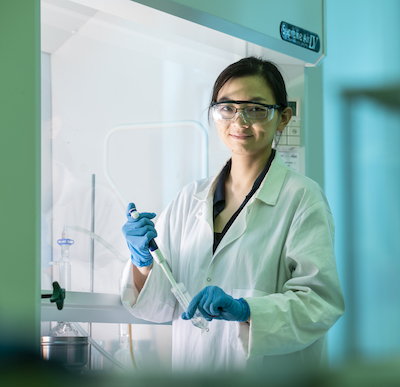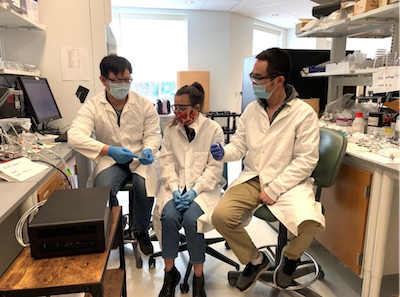In This Story
With 97% of the world’s water held by oceans, the effort to develop effective saltwater desalination is a high priority amongst the world’s scientists. Capacitive deionization (CDI), where ions and chemicals are removed from water by applying a low electrical charge, is the most prevalent process. However, there is much more to understand about the kinetics of the process, which could improve the salt absorption capacity of CDI.

It was this challenge that caught the interest of Pei Dong, an assistant professor in the Department of Mechanical Engineering at George Mason University’s College of Engineering and Computing. She recognized that tackling this topic would be substantially boosted by incorporating research underway in the lab of Baoxing Xu of University of Virginia’s Mechanical and Aerospace Engineering Department.
Their project, “A study on the ultrahigh salt adsorption capacity of an energy-efficiency water desalination technology,” was supported by a 4-VA@Mason Collaborative Research Grant with the goal of designing next-generation electrode materials to advance the energy-efficient CDI technology.
Xu’s group investigates multiscale/multiphysics modeling and simulations of solid-liquid interactions, especially systems in response to external stimuli such as temperature, electrical, and mechanical fields. Together, Dong’s group and Xu’s group could investigate the adsorption process to further identify, design, and synthesize more effective carbon materials for use in the CDI process.
Fast forward through the research—complete with a pandemic and the resulting lab closures—Dong and her team report that they have indeed synthesized different carbon materials that show a much higher salt absorption capacity. Dong anticipates that this technique could dramatically lower desalination costs and contribute to the sustainable development goals in Virginia, the United States, and beyond.
Along with this successful research outcome, the project also produced several other beneficial consequences, especially a new collaboration among Mason and UVA faculty and students. Dong also noted the journey provided a rich educational experience for students—with a combination of experimental and computational skills allowing them to contribute to future engineering innovation in this emerging field.

That experience was especially true for PhD candidate Rui He. He oversaw the project in Dong’s lab and administered the tests, including those for surface area, water contact angle, electrical property, and water desalination. He also prepared the wood-converted carbon and the potassium hydroxide activation.
“I learned a lot about teamwork,” He said. “I needed to teach the undergraduates how to run the lab experiments and data analysis as a team, and make sure every step is what we wanted.”
In addition, the team worked together to print a 3D CDI cell and assembled the experimental setup, installing the wood-converted carbon into the cell.
“Sometimes we didn’t get the results we expected, and we needed to find out where things went wrong and fix the problem,” He said. “For example, the 3D-printed CDI cell was a challenge at the beginning because it can’t prevent the leakage of water. We tried a lot of different designs, and finally got one to work.”
Several of the other Mason students involved in the research were undergraduate Crystal Bowers and PhD candidate Xiaozhou Huang.
Thanks to the project’s success, the research has received wide recognition. Their work “Binder-Free Wood Converted Carbon for Enhanced Water Desalination Performance” has been published in the journal Advanced Functional Materials.
He won the Excellent Student Presentation Award in the 242nd Electrochemical Society Meeting for both his oral presentation and poster about the project. This work has also been presented at Virginia Clean Energy and Catalysis Club 2022 Summit (poster) and the International Mechanical Engineering Congress and Exposition 2022 (oral presentation).
4-VA is a partnership among eight Virginia universities, created to foster collaborations that leverage the strengths of each university and improve efficiencies in education across the commonwealth. Thanks to 4-VA, unprecedented alliances between schools, departments, faculty, and students generate significant, innovative solutions to educational and real-world challenges.
